Really, I don’t know what to write as an intro. I’ve done this twice before, so go back and read those intros if you really need a preface. Just a couple notes before we begin:
1. I broke down. While I was compiling my list, I kind of forgot that I wasn’t supposed to have ports on it, but they were there, and I just love the included games so much that I couldn’t boot them. Oh well.
2.There are three special awards mixed in between the regular list, just so you don’t get confused. I was going to have them all before the actual list, but that’s so dumb. My way is spicier!
3. I think the 10th-4th place trophies are hilarious. If you don’t agree, I am terminating our friendship right now.
Well, that should be all. So let’s get it on!
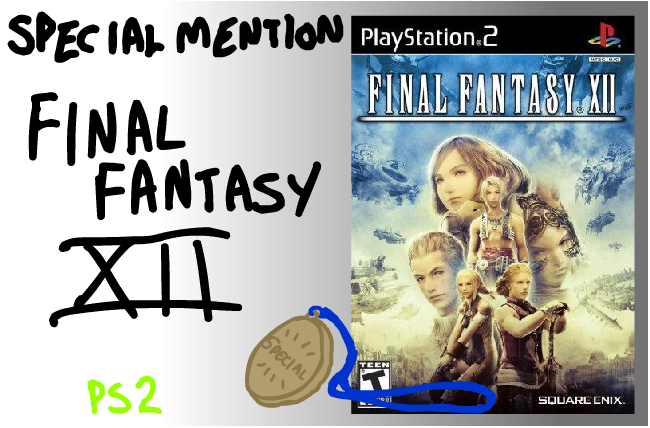
Before we really get rolling, I just want to give out some special props like I did last year. I think I’m going to include a couple special awards every year from now on. What they might be each year is impossible to say, but I know I’ll keep the “Special Mention” (the award for the game I wanted to play most, but never got a chance to) award kicking around. It’s a good award.
2006’s “Special Mention” goes without a doubt to Final Fantasy XII. Because there were so many other games that I had planned on purchasing (and when I set my mind to something, I never go back), I never got around to playing FFXII. It just came out at a really bad time. Had it been released in the summer lull, I would have definitely picked it up right away. Sadly, Square-Enix didn’t have it ready until November, and that month was just so chock-full of games that were higher on the priority list that it got passed by.
The reason I put it here is because I do have a genuine interest in it. It’s the first Final Fantasy since IX that I’ve cared at all about (and even that was only because at that time I was still a Squaresoft sheep), and I really do hope to get around to playing it someday. The way the game plays, with it’s neat little character programming system interests me to no ends, and even the story, which I usually have zero interest in, fascinates me. And let’s not forget that so many reviewers are saying that it’s the best FF to grace a console since God-knows-when. And that’s a pretty strong point, because let’s face it, most of the gaming world thinks FFVII is good.
So in conclusion, I declare Final Fantasy XII to be the best game I never played last year. However much sense that makes.
•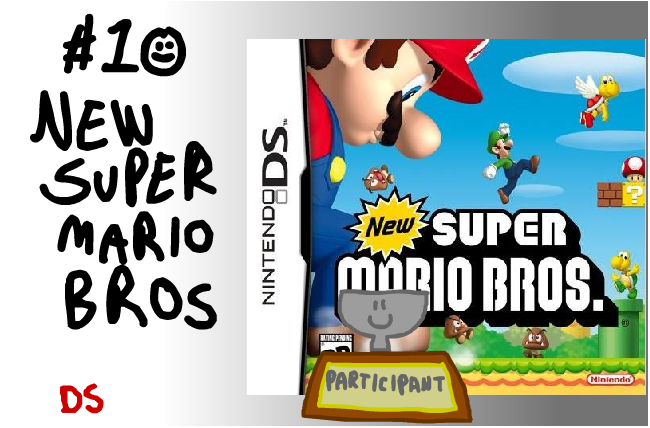
Hey, what can I say? I’ve been waiting for a new Mario side-scroller for a while now. God knows why Nintendo didn’t make one on the GBA. Oh, right. They had all those old games to rehash. Must have saved them a ton on, you know, work. Can’t win ’em all though, am I right?
Past grievances aside, I really enjoyed New Super Mario Bros. Like everyone else on the damn planet, I flew through it pretty quickly because it was real easy, but it was impressively fun. I even played through it a second time right away. Of course, while getting to the end of the game presented little more than a suggestion of difficulty, clearing the game 100% did require a bit of skill. The big coins, finding all the extra paths and warp cannons, that kind of stuff. It wasn’t as tricky as some of SMW’s rough bits, but all the extras really helped to flesh out the game. The new power-ups were pretty unnecessary too. Unless they were needed for getting somewhere, I much preferred good ol’ Firey Mario. Why did they axe fireballs in the 3D games? Firey Mario would have been so much totally better than FLUDD. Maybe.
I don’t know. NSMB was such a big deal that everyone and their mom wrote about it, and everyone’s read something about it too. I doubt I could add anything original at this point. I guess if there’s anything that really stuck out for me, it was the final boss fight. It wasn’t terribly difficult or long, but it was pretty epic. For a Mario game. Hey! You know what would have been great? If there had been some Yoshi. Yeah. Especially if he had all his Koopa shell powers like in SMW. And there should have been a Top Secret Zone where you could go after every level to gather power-ups. Sigh. It’s going to be quite a feat if Nintendo ever expects to outdo Super Mario World. That’s pretty much the definition of a perfect platformer. But New Super Mario Bros was easily good enough. Just barely good enough to beat out Rayman Raving Rabbids out of the #10 spot, but good enough no less.
•
I’ll be the first to point out that technically, I’m breaking my “no ports” policy, but I have many good reasons to back this up. First of all, there is a good deal of extra content. For every so many operations you finish on the main storyline, you unlock operations for a different story featuring a different doctor. Secondly, while the main story is almost a word-for-word copy of the DS game (with prettier graphics), the completely different control methods make the game seem totally new. Sure, you know
what to do, but now
doing it is a whole new experience in itself. Also, a couple levels have changed dramatically, specifically the bomb level.
So the game then? Well, it’s neat. The premise is that you’re a doctor (by the name of Derek Stiles) who just completed his whatevers and is getting into the real world of surgery. It starts off like any old medical drama you’d see on TV, with the new guy being uneasy and having to overcome personal obstacles and crap, and then bio-terrorism enters the picture and everything goes to shit. It’s an incredibly story-heavy game, to say the least. Some chapters don’t even contain an operation and are just really long dialogues sequences. Fortunately, it’s all skippable for those who couldn’t give two shits an’ just want to cut people open and toy with their insides. Which is awesome. The game starts you off with easy things, like suturing up cuts, removing shards of glass, and lazering the crap out of polyps. It slowly ramps up to tougher things like excising bigger tumors and removing thrombi. Less than halfway through, though, the video game part starts to come into play and you have to start removing various types of (fictional) parasites (known as GUILT), which can be real pains in the ass. Unlike the original game, however, there is a difficulty option, so getting to the end of this one isn’t such an impossible feat; you can just choose to play on easy mode!
The operations in the side-story abandon the GUILT for more traditional surgery. Though the game throws in a few new things and some curveballs like fixing broken bones, excising super tumors (which grow right back if you don’t get them all out within seconds of each other), and working in the dark with only a camera’s flash to help you see. The extra story, while much more brief than the main one, is also pretty interesting, though it’s even more obvious that it was thought up by those crazy Japanese.
All in all, even though it’s essentially a beefed-up port, Trauma Center: Second Opinion is very much its own game. While playing with the Wii Remote is slightly less accurate than the DS’ touch screen, the control scheme is very intuitive and great for switching tools fast. It’s still as challenging as the original though, so don’t expect any pulled punches, even on the easy difficulty level. While it’s no epic adventure, I still think TC:SO is a spectacular launch title for the Wii, and were it not a port, I may have even put it up closer to the top spot on the list. As it is though, number nine will have to suffice.
•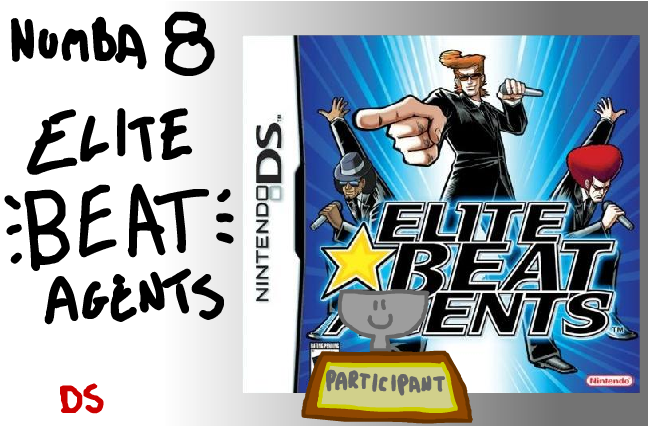
What’s with all the DS games, you ask? They’re pretty good man. You should invest in one. It’s definitely the greatest portable gaming thingamijig ever. Hell, I play my DS more than my GameCube and PS2 combined. We’ll have to wait a year or so to accurately measure how the little Wii does. But there are games to be ranted about! On I go! Holy crap I think I’m getting
worse at writing!
So Elite Beat Agents, huh? Surely you’ve heard of the import hit Osu! Tatake! Ouendan!. Surely. I never bothered to import it (I got Jump Superstars instead), but when I heard they were making a version (sequel?) for North America, I was ready to jump all over it. And jump I did. EBA is a rhythm game, much like DDR or Guitar Hero, only instead of some cockadoodie $50 peripheral device that only works with one game, you just use the touch screen. As the music goes, beats appear on the screen. Most of the time, you just tap them with the correct timing to get by. But sometimes, you have to drag a ball across a path which spices things up a little. Well, maybe not. There’s also a spinner that you’ve gotta, well, spin. That one only shows up on the rarest of occasions though. All this happens while zany situations play out in the background, as the idea of the game is that the Elite Beat Agents motivate people through song to help get them through tough times. Well, there’s actually one scenario that’s quite sad rather than zany, and ashamed as I am to admit it, it had me weeping like a little girl. Seriously. If you can play the “You’re The Inspiration” level without shedding at least one tear, you’re made of stone, man. Fucking stone.
Like many of those other rhythm games out there, Elite Beat Agents out there is hellishly difficult. Which is odd because Nintendo stuck it in with the “Touch Generations” games, which are supposedly accessible to everyone. I guess most people could get by okay on Breezin’ (easy mode), up until the last song, “Jumpin’ Jack Flash” (a snazzy fast version too), which is like 50 times harder than all the other songs. And while I’m on the song note, the soundtrack is definitely there not for any single niche, but rather a hodegpodge of crap from all over. On the awesome hand, you’ve got kickass bands (well, covers of kickass bands) like Deep Purple (“Highway Star” FTW) and The Stray Cats, but then you’ve also gotta suffer through dreck like Cher and Goddamned “YMCA”. I mean, personally, I don’t mind too much, but I know that’s more than enough to turn off some people. And that’s sad, because EBA is a frickin’ awesome game. My only complaint is that they cut like a minute off of Hoobastank’s “Without A Fight”, wich is a stellar song.
If you’re looking for a distraction, maybe go play Magical Starsign or something. If you pick up Elite Beat Agents, you’ll likely get sucked in and lose hours upon hours trying to beat “Canned Heat”, assuming you’re as bad at this game as I am. But yes, this is a sweet game. I really shouldn’t have to say that, what with it being eighth on my list of the ten best games that came out last year and all.
•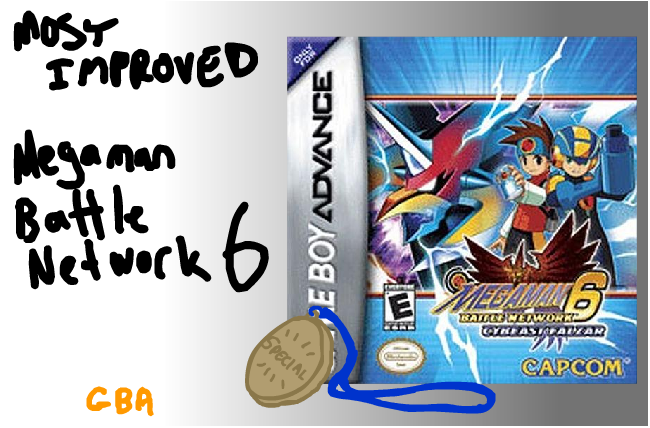
Our second special award this year is the “Most Improved” award. We always had one of these back in junior high back when they still gave out little trophies and medals to all the smartest kids, so I thought it would be a neat one to have here. The “Most Improved” award is for exactly what the name implies; a game that vastly improves over the previous entry(/entries) in that series. Whether it’s because the previous game(s) stunk like ass, or the sequel is just that much better, we don’t care as long as it beats out it’s predecessor(s).
MegaMan Battle Network 6 is not here because it’s a great game. It’s not ground-breaking, it doesn’t deliver a compelling story, even the gameplay is pretty much unchanged from the first game in the series. What does make it special is that it’s the only MMBN game that’s really been worth playing since 2. And I mean that quite literally. I got into the series at 2, and I loved the game to death. I explored every nook and cranny of it, and I got everything there was to get. 3 was okay, and while I did finish it 100%, my whole heart wasn’t in it. 4 flat-out sucked, and 5 was mediocre at best. Needless to say, I didn’t come anywhere close to finishing those two. Then 6 came along, and I felt the same spark I did for 2. And I played the snap out of it.
So what makes it better than the abysmal 4 and 5? I’m not too sure. It’s basically just the same thing over again. Look at any MegaMan series, and that’s the way it is. But there are a few little tweaks that propel it above the rest. Capcom changed the power-up system just enough so that it made the game fun, and not a hassle. In the two previous chapters, your battle power-ups (Soul Unison) would only last three turns, and they were kind of useless. There were also these horrid “dark chips” that completely broke the game unless you ignored them completely. In 6, the power-ups (Cross Change) are now virtually unlimited, and most of the Crosses are useful and/or fun to use. The dark chips have pretty much been tossed away altogether as well.
Maybe it doesn’t make sense to you as an outsider, and it isn’t entirely clear to me either, but MegaMan Battle Network 6 is somehow a much better game than the last few in the series. Best of all, it’s the last game in the series, so you don’t have to hear any more about it, and I don’t have to worry about it going down the shitter again. Definitely the most improvement in a sequel I’ve seen in a while.
•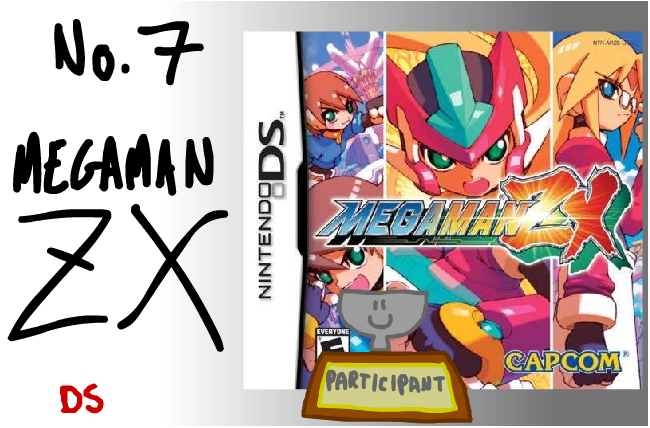
Yeah yeah. More MegaMan. I know, I’m weak. But this one is actually a seriously kickass game, and not just on here because of my insane fanboyism. It plays like a stronger, faster, more intense version of the MegaMan Zero games, two of which hit the chart in the past two years, so it’s really no surprise that ZX showed up.
The game is actually pretty far removed from MegaMan though. It’s MegaMan only in name, really. I mean, there are a few references to past MegaMan storylines, but aside from that, you could essentially put a different name on it and nobody would know. But it is MegaMan, and with that comes the promise of top-notch side-scrolling action. Like I said, it plays like the Zero series, so it’s fast and rather intense. The difficulty level has been toned down a bit, but most of the bosses and certain parts of the game will still give you a good run for your money. Adding to the greatness of it all, it plays like a Metroidvania title, in that the game is one big world for you to explore, rather than being cut up into levels. Of course, you can only access certain areas once you’ve got the right items, but unlike Metroid and Castlevania, those end up being more on the end of card keys rather than power-ups.
When you do get power-ups, they take form as different suits of armor for your character to wear. The game revolves around Biometals, which are basically rocks which hold the essence of various MegaMan characters. Once you gain a certain Biometal, you can use it and gain the powers of whichever robot it represents. Such powers include increased dash abilities, hovering, better water mobility, and being able to break select few walls. Half of them are pretty useless for regular combat, but there’s a secret Biometal you can earn which kicks complete and total ass. Still, playing the entire game as only the default MegaMan should be more than enough to please fans. The extra powers are just kind of for fun and finding secret stuff.
One of the coolest things about the game is that bosses regenerate themselves, so you can go back and fight any of them whenever you feel, without having to start a new game. You can even insert MegaMan Zero 3 and 4 into the GBA slot to pick fights with a few bosses from each of those games. I don’t really know what else to write about. The game is all about action, and dueling the multitude of boss robots is about as awesome as it gets. For anyone who thinks the MegaMan name should have died long ago, MegaMan ZX makes all those years of crappy X and Battle Network sequels totally worth it.
•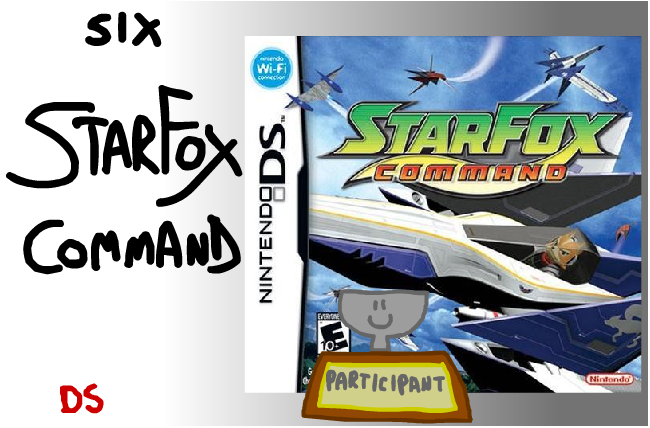
Ever taken the time to dig up the StarFox 2 ROM? Well you’d be pleasantly surprised if you haven’t already, because StarFox 2 is totally great. It’s radically different from the original, but still maintains the StarFox feel and manages to rock all over the place. StarFox Command, as I would find out, is basically an extension of the wonder of technology that is StarFox 2.
I won’t dance around the fence here, there aren’t any on-rails flying levels in StarFox Command. It’s all all-range enemy hunts. And those are the butter to the game’s bread of strategic map-conquering. Sounds awfully sketchy, I know. That’s exactly what I thought. But, because I just can’t say no to StarFox, I picked up the game anyway. It couldn’t be any worse than StarFox Adventures, anyway. Long story short, the game is awesome and I feel awful for ever doubting it. The franchise has had some rough times, but if Command is any indication of where it’s going, then the outlook is pretty damn good.
So what’s this strategy business I mentioned? Simply put, each mission takes place on a map of whatever planet/area of space you may be currently flying around. The aim is either to destroy all the enemy fighters while defending the Great Fox from attack. Sounds simple, and it really is. But things get tricky once stuff like missiles and fog of war get involved. Yeah, that’s right. Fog of War. In StarFox. it’s weird, I know, but it works. Keeps things interesting, and you on your toes. So encountering an enemy or an enemy base on the map will initiate a dogfight, where your objective is to destroy all the listed bogeys within the time limit. Yep, there’s a time limit too, but trust me when I say all the game mechanics work perfectly well together. And speaking of which, the whole game is played with the touch screen. All the buttons on the DS do are fire your blasters, except the start button, which does the usual pause. Barrel rolls, loops, bombs, it’s all touch-activated. And it’s all good.
The only complaint I have with the game is actually with the series as a whole. I hate that the fact that they continually age the characters. At this rate, two games from now, Fox McCloud won’t even be in the games anymore. That or he’ll be an old fogey handing out advice, rather than blasting space monsters and whatnot. But aside from that little complaint, the game is stellar. Tons of story paths to choose from (though the story[ies?] isn’t particularly strong), great strategy and action gameplay, and good local multiplayer (sadly, WiFi multi is kind of disappointing). This isn’t the highest-ranked DS game on the list, but it’s probably the one I’d recommend the most. I just love it to death.
•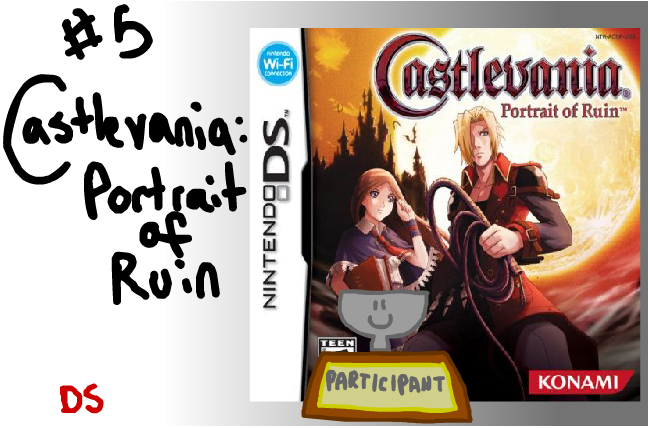
Durr, more DS loving, coming right up. Castlevania: Dawn of Sorrow was granted a spot on last year’s list (#9), and now that I think about it, I really think I should have placed it higher. But it’s too late for that, so let’s just forget it and move on to this year’s contribution to the Castlevania franchise.
For everything Dawn of Sorrow did right, Portrait of Ruin comes and does it even better. Mostly. I mean, the games play essentially the same, but Portrait of Ruin is so much more refined, with so much more to it. Firstly, you get to play with two characters, Jonathan Morris and Charlotte Auldin, at the same time in PoR, which turns out really well. You have the choice to either just swap out between the two, or have the non-player character follow you around and help you out (using your MP bar as a life gauge). Either way you choose to do it, the system is great, and allows for a lot of choice in how to get around different enemies. Dawn’s Tactical Soul system is gone, replaced by subweapons and spells for Jonathan and Charlotte, respectively. While the Tactical Soul system was really great for customization purposes, I really like just having the basic subweapon/magic instead. Also, only some of your subweapons/spells are held by enemies, basically meaning you don’t have to grind every enemy in the game to have access to your full arsenal. That, and the Shuriken subweapon is insanely cheap once it’s mastered.
The castle is scaled down a bit on PoR, but that’s because there are nine other maps to explore! While the bulk of there are pretty small, it’s still the biggest Castlevania yet, as far as raw acreage goes. Sadly, the second set of four “levels” just feel like remapped copies of the first set with harder enemies. The castle itself is as great as ever though, and the ninth (optional) level is a very sweet colosseum-esque stage with some horrifically challenging battles inside. And speaking of horrifically difficult things, the bosses in PoR are crazy hard. The bulk of them will slaughter you pretty quickly on the normal difficulty. Needless to say, I’m a bit afraid to start a hard game. The final boss battle isn’t quite as rough as some of those leading up to it, but it’s quite a spectacular fight. Seriously. Fuck you, I’m spoiling it. You have to fight Dracula and Death. At the same time. And then they fuse. It’s awesome. If you look up the word “Awesome” in the dictionary, you’ll see a picture of PoR’s final boss fight.
And speaking of awesome stuff, there’s a ton to accomplish in Portrait of Ruin. Firstly, you’ve got the main game with it’s hugely long main quest, plus all the fun of fleshing out complete maps, completing all the quests, getting (and mastering) all the subweapons and spells, getting all the enemy drops and filling out the item collection. That alone took me over 25 hours. Then you unlock a whole whackload of shit. Not only one, but three bonus game modes, plus a hard mode for all four games. Then there are three Boss Rush mini-games to play (because there are just that many bosses in PoR). To top it all off, there’s a nice little WiFi option in which you can either buy/sell items from/to other players, or join up with someone else to play a co-op Boss Rush. The co-op mode doesn’t offer much of a challenge, really, but competing for top times is always fun, and the Shop Mode is decent if you have a bunch of rare drops and need to make a little extra coin.
Holy smokes. This is going to be like the longest article ever. By me. In any case, Castlevania rules. If you still haven’t waded into the series, I would highly recommend now to do it. It’s really not going to get much better than this. Konami’s set a very high standard for themselves, and the only way to really improve upon Protrait of Ruin would be some more diverse level design, and to go back to artwork that doesn’t look like it came out of a crappy Saturday morning anime. Seriously. Dracula looks like crap in this one. Normally he looks awesome and evil, but here he just looks like Uninspired Anime Villain #43. Don’t even get me started on Death. Eeeeeewww. Fuck, Konami. We know you have talented artists. Why did you not use them?
•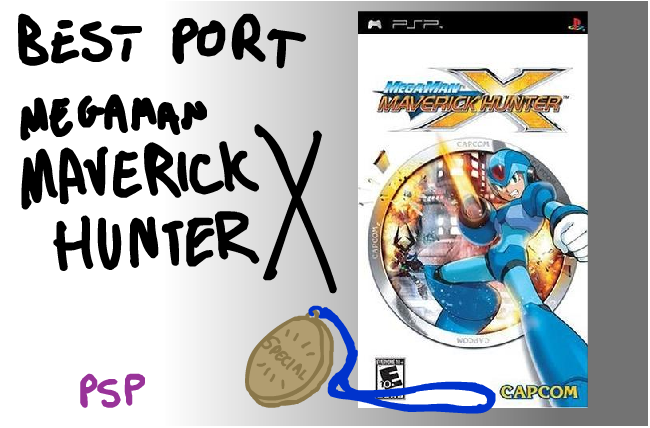
“Wait. What?” you ask, “I could have sworn that game was for PSP.”
It’s true. I’ve been hiding a horrible, horrible secret from everyone: I broke down a bought a PSP a while ago. Under most circumstances, I’d feel pretty bad about it, but MegaMan Maverick Hunter X is just so damn awesome that I don’t care. It was worth every penny to be able to play this remake of one of my favourite games ever. As I’ve stated many times before, I’m quite a MegaMan fanboy. It’s a tough lot in life, but it’s the road I chose. And this road has led me to play nearly every MegaMan game in existence; some good, some bad, some utterly repulsive. But through it all, one thing has remained constant: my love for the original MegaMan X. I don’t know why I love it so, but that’s the way it is, and I doubt it’s ever going to change.
Maverick Hunter X is a full overhaul of MegaMan X, much like how Capcom redid Resident Evil for the GameCube. It keeps everything that made the original X great, and makes it better: the superb music, the harrowing storyline, the highway stage. Everything. Sure, they moved most of the power-ups around to throw off vets, but that’s quite alright. Incentive to fully explore the stages again is a good thing. Most of the stages do retain their original layout, but the Sigma palace levels are all completely mixed up, with some bits moved around, and some entirely new parts. It’s great. Even the transition to 3D graphics worked marvelously, beautifying the levels, and making some of the bosses look more like the animals they were modeled after (Spark Mandrill, anyone?).
Best part of the game? Hard to say. Firstly, they’ve included a 30-minute movie detailing to origin of the original Maverick outbreak, which is an absolutely awesome bonus feature. Second, you get a Hard difficulty level to play on once you’ve slaughtered the game completely, and hard it is. Bosses get new attacks, you get less life, all that good stuff. Third, Vile is a playable character! Once you’ve finished the game once with X, you can play through as Vile, who plays completely differently than X and adds a whole new layer of strategy to the game. And Vile’s game is nail-bitingly tough on the normal difficulty to boot. Hard mode with Vile is nigh impossible.
So in conclusion, this game is more than enough to warrant the purchase of a PSP for me, no matter how outrageously expensive it was. As such, MegaMan Maverick Hunter X gets the award for Best Port. Quite frankly, I wanted to place this game at Number 5 on the list, and while it does contain a gigantic deal of new and altered content, I just couldn’t bear myself to put two ports on the list. So why did Trauma Center make it? Because quite frankly, all new content aside, the core gameplay in MHX doesn’t change much at all, while Trauma Center’s is radically different from that of the original game. Still, I give Maverick Hunter X a great big recommendation, because it’s a really, really sweet game.
•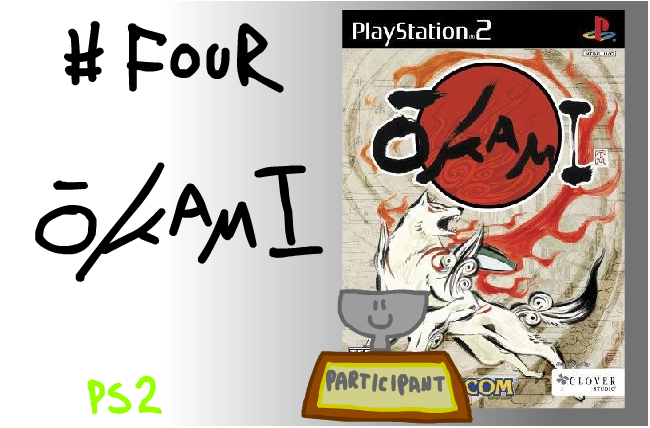
While Okami certainly deserves a place in the top three, I’m afraid there are just other games that I have far too much brand loyalty to to say no to. But hey, if it’s the fourth best game I’ve played all year, that’s still putting in a pretty damn good word for it.
Ever since Clover Studios (now defunct) opened their website, which had a preview page for Okami, I’d been following the game from a distance. It wasn’t something I was anxious about, but it was on my radar. Then September came around and poof! there it was, and it was getting spectacular reviews. The good reviews coupled with Clover’s high standing in my mind and the beautiful art style were more than enough reason to rush out to the store and pick it up. And pick it up I did. Okami was more than I ever expected it to be. I was thinking it would be some sort of run-of-the-mill 3D adventure starring an animal, but it turns out it’s essentially Zelda for PS2. Seriously. At first, I was kind of on the fence about how much it resembled Zelda, but then I got to the first dungeon and I couldn’t help shaking the feeling that I was retreading the Forbidden Woods level from The Wind Waker, only as a wolf. There’s even a postman who, aside from attire, I would swear is the same as the one from Ocarina Of Time.
So what makes Okami original? Well, for one, you play as a wolf. Oh, right. Twilight Princess. To tell the truth though, now that I’ve played both, I can confidently say that I much prefer the wolf play in Okami. It just feels so much more natural. There’s also the fact that half the game is based around drawing stuff. Yep. Your special power as a God-in-wolf’s-clothing is to be able to paint stuff to make things happen. Over the course to the game you’ll learn many different brush techniques, letting you do many things ranging from slicing trees to making wind blow to creating bombs out of thin air. It’s awesome and works incredibly well, no matter how odd it sounds. Even though the game pauses for you to draw, it doesn’t really mess up the pacing of the game. It’s really not that fast-paced a game anyway, aside from battles. And those are pretty nuts. The boss enemies in particular are really impressive and require some tricky brush maneuvers to defeat. It’s also worth mentioning that they’re much more difficult than any of Twilight Princess’ bosses, no matter how gargantuan those may be.
One of the neat points of Okami is the focus of the game. I’m not a big fan of nature, but since this game is influenced so much by Japanese history and lore, most of the game revolves around saving nature and using your powers to help people and restore their faith in the Gods. Leveling up is actually done not by battling, but by gaining faith by helping people, animals, and plants. It’s a very refreshing change from the usual game that takes itself too seriously and focuses on saving the world from utter destruction. Playing Okami is like taking a beautiful, relaxing vacation from normal video games, in the same way The Wind Waker was from other Zeldas. It’s just so pretty and stylish that you could just roam about and enjoy watching the scenery go by.
There’s much more to be mentioned, but there’s a better way than listening to me ramble about it: go out and buy the game. Trust me on this one. It’s fantastic. Fifty dollars is a bargain for such a fine piece of art. The only thing that really makes me wonder is why this wasn’t a DS project. I mean, it’s all about drawing after all. And Tony Hawk proved last year that cel-shading looks pretty good on the little handheld that could. Even a sequel (on either platform) would be fantastic, but I doubt that we’re going to see one, what with Clover being broken up and all. Worst decision ever, Capcom. And you’ve make some pretty big fuck-ups. Anyway, I know you own a PS2, everyone does. Go out and buy Okami. You’ll be doing yourself a huge favour.
•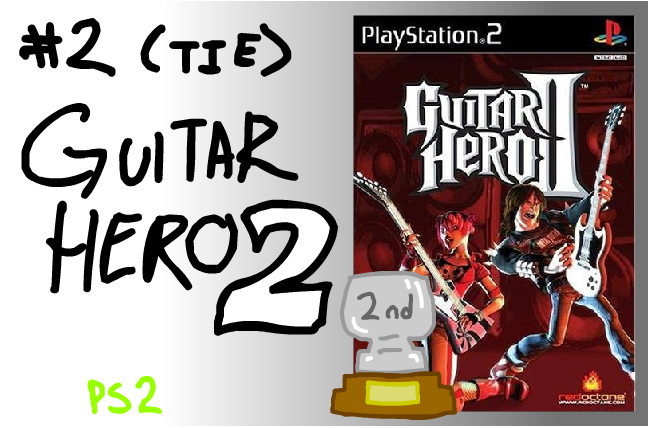
If you read my blog, you can pretty much skip this. You already know how much I loooove Guitar Hero. Best peripheral/music game ever. And the sequel only makes everything better. Well, as better as it can get.
First off, we’ve obviously got ourselves a new soundtrack. It’s quite a bit longer than the original too. Boasting 17 more songs than the first game, Guitar Hero 2 comes full of bands that I love (though the regular songs are all covers) like Cheap Trick, KISS, The Stray Cats, and Rush. Fucking RUSH. That alone is enough to boot the game up to the top of the list. Anything that features Rush must be good. It’s science. Some other bands/artists that I’m happy to see include The Police, Dick Dale, and (the return of) Megadeth. GH2 is also a helluva lot harder than its predecessor. I’m not saying Guitar Hero was easy, but some of the songs on this one seem like they were put in there just to break even the most confident players. You ever heard All That Remains’ “Six”? Or how about Buckethead’s “Jordan”? Incidentally, while “Freebird” is the final song, it’s not nearly as bad as it might seem by ear. I’ve actually gotten rather good at it. “Thunderhorse” on the other hand, continues to wipe the floor with my sorry ass.
On the gameplay side of things, it’s exactly the same. hammer-ons and pull-offs were changed just a leetle bit to make life easier, assuming you’ve the ability to put the techniques to use. I’m learning slowly, and surprisingly enough they’re actually helping a bit, and making my game all that more impressive to passers-by. There are a couple new characters to choose from, including the frightening and poorly proportioned Lars Umlaut. All the default characters also have a second costume that you can unlock. Also, the range of guitars you can buy and use has increased exponentially, and there are plenty of different finishes for each style to boot. There are even secret guitars that can be unlocked by beating and five-starring each song on each difficulty level. Obviously, the best ones are the hardest to unlock. Finally, the unlockable songs (some mentioned above) are mostly better than the last game’s offering. A lot of awesome bands return, including Freezepop (<3 Freezepop), Drist, and the Acro-Brats. Made In Mexico still sucks though. And then there’s great new bands like The Last Vegas, Bang Camaro, and That Handsome Devil. On a related note, I’ve actually seen Every Time I Die in concert, which is kind of neat.
The new training mode, I assume, is rather useful. I’ve used it very little, but it has helped me improve a few rough spots and pass a couple songs on the expert difficulty. I might get really good at the game if I were to make better use of it, but as it is, I prefer just to play a song over and over to learn the ins and outs, even though practicing parts of a song at slower speeds sounds like a much more practical way to do it. Multiplayer is vastly improved, with better competitive options, and a spankin’ cooperative mode. Add the fact that on co-op you each play a different guitar part (lead, rhythm, bass), and you’ve got some wicked shredding going down.
•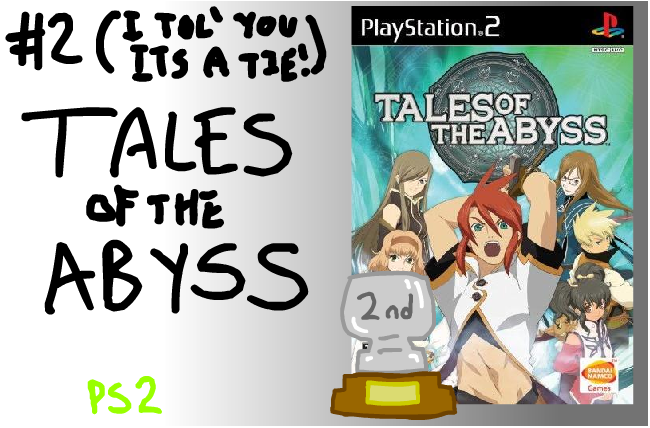
It was impossible for me to decide between Tales of the Abyss and Guitar Hero 2 for second place, so I had to tie them. It’s a reasonable compromise, don’t you think? I just adore both games so much, how could I put one over the other?
If you’ll recall, I named Tales of Symphonia the best game I’d played in 2004. And Abyss doesn’t fall far from that tree. But wait, there were two Tales games released this year, and Tales of Legendia isn’t even on the list! So what gives? Quite frankly, for all the things I liked about Legendia, I could just never get into it. I found the characters lovable, the story great, and the battle system fun, but literally I had to force myself to put the game disc in and muscle through it after the first half of the game. I don’t know what it was, but somewhere the attraction waned. Fortunately, Tales of the Abyss came along a short few month later to make everything better. It might even hold a higher place in my heard than Symphonia, if it weren’t for Symphonia’s exquisite character design and writing.
If you want a basic review of Tales of the Abyss, go find the Tales of Symphonia review on the September 2004 page in the blog archive. All the great things about that game translate directly onto this one, with only a handful of real changes. Obviously, the story and characters are different, but the overall feel of the game is essentially the same. The soundtrack is (mostly) once again by genius Motoi Sakuraba, which means it’s good enough to purchase twice. The battle system is almost exactly the same as that in Symphonia, the only real differences being that you can run around freely (after acquiring a certain skill), and a slightly altered magic system. Really, if you’ve played any previous Tales game, you should have a good idea what to expect: RPG battles that play out almost like Super Smash Bros.
One of the big changes are the various stat/ability-altering systems. Capacity Cores will add to your stat increases during level-ups, allowing you to super-power your characters in whatever field(s) you have a Capacity Core for. Fon Slot Chambers allow you to attach an FSC to each of your spells/skills to add different effects, depending on the skill and FSC colour. For example, a red FSC on most skills will increase attack/healing power, while a green FSC will usually decrease TP consumption. Lastly, we’ve got Additional Skills. Your characters will all gain AD skills when they reach certain levels or increase a stat to a certain number. Some are pretty basic, like moving faster in battle, while others have awesome effects like being able to use Over Limit attacks and avoid status effects. All three systems add a far deeper level of character customization than even Symphonia did with its wacky Exsphere business.
Tales of the Abyss doesn’t stray much from the Tales mold (except for they’ve been cutting out the Summon Spirits completely lately…), and that’s exactly why I think of it as lovingly as I do. Namco has a real winning formula here, if only the general populace would free themselves from the shackles of Final Fantasy and realize that there are fun RPGs out there, the world would be a happier place for all. Again, it’s science.
•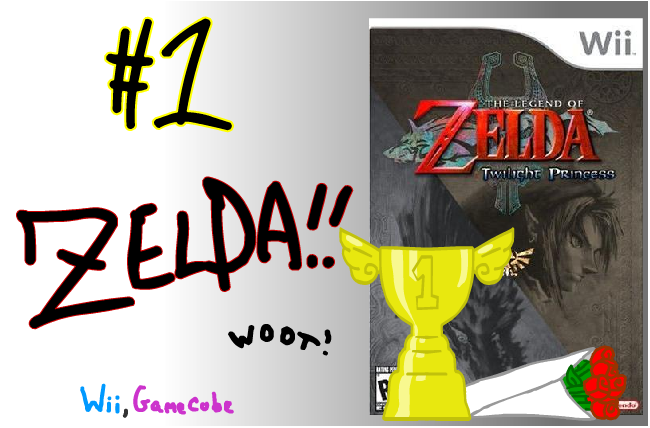
It’s fucking Zelda.
Yeah I’m leaving it at that. Sometimes the point is best made with few words. In any case, I know this list might be a little harder for some to agree with than previous lists, in which I ahd a slightly higher percentage of popular games, but meh. These are the kinds of things I like to play. If you don’t like it, go back to whatever overhyped garbage you think is good. Also, blow it out your ass.

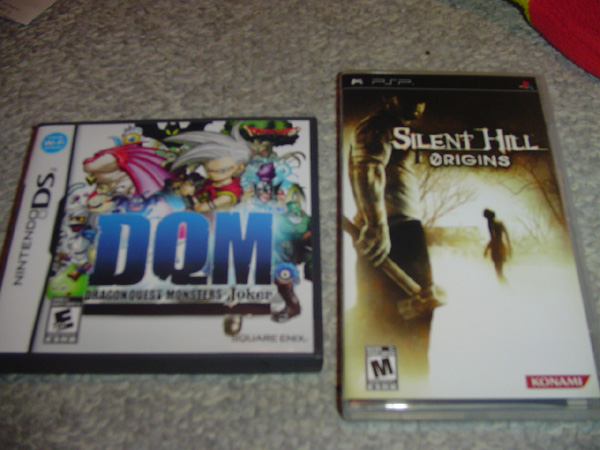
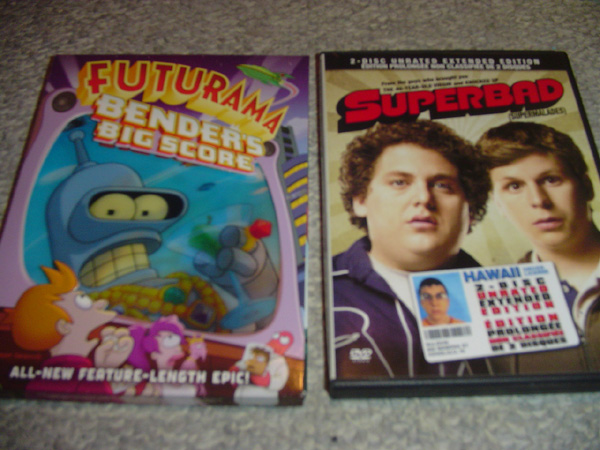
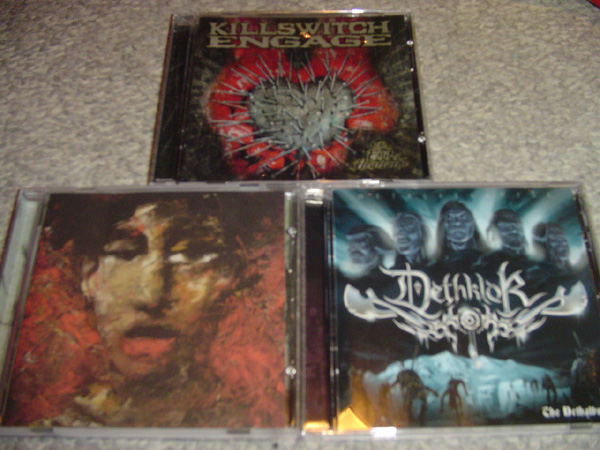
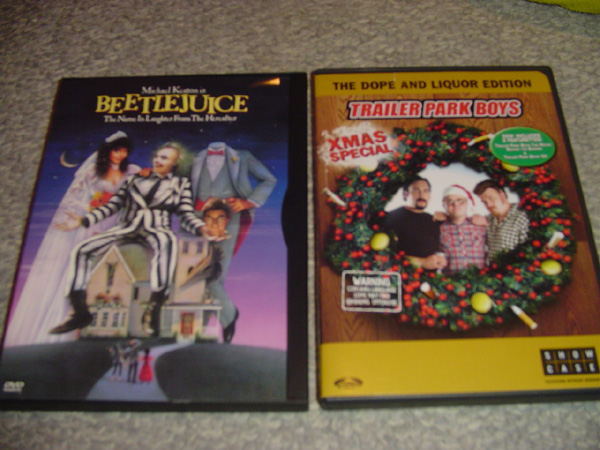
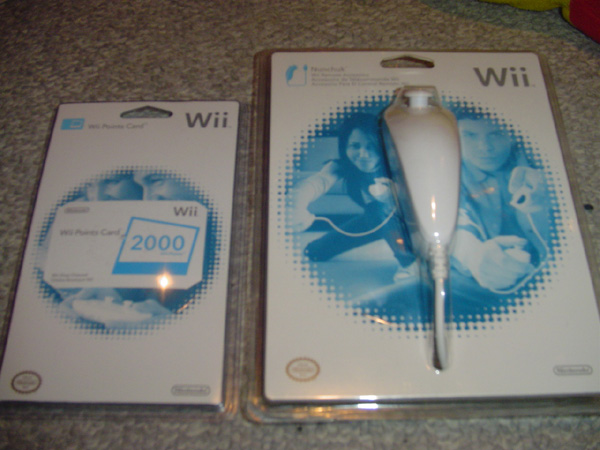
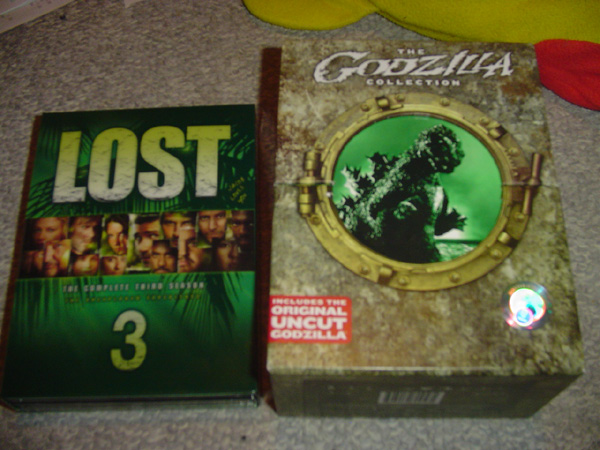
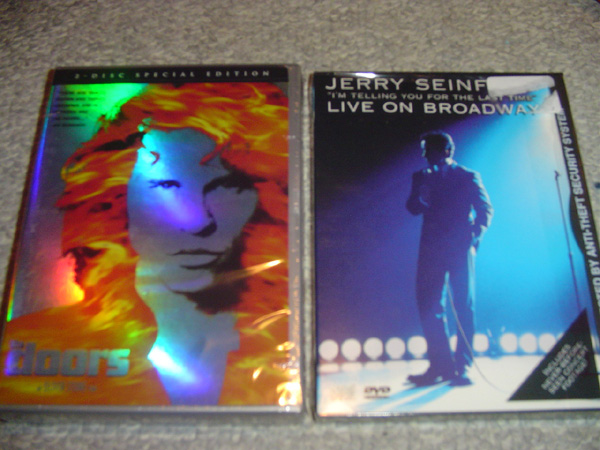
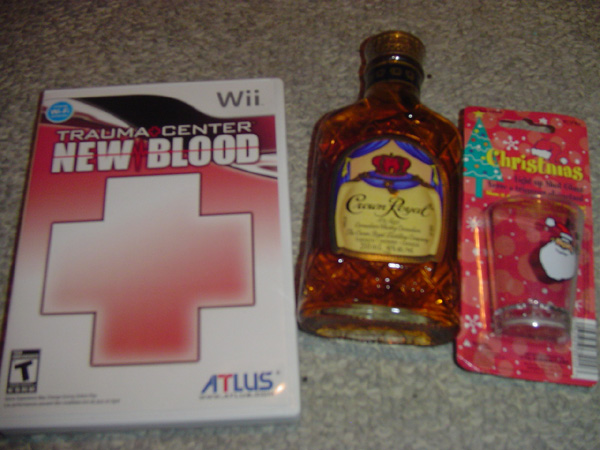
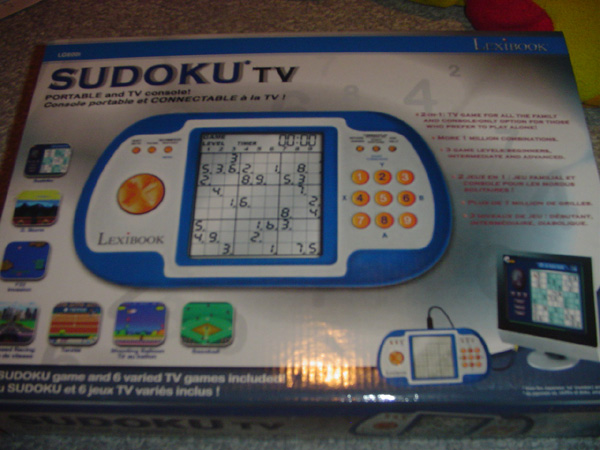

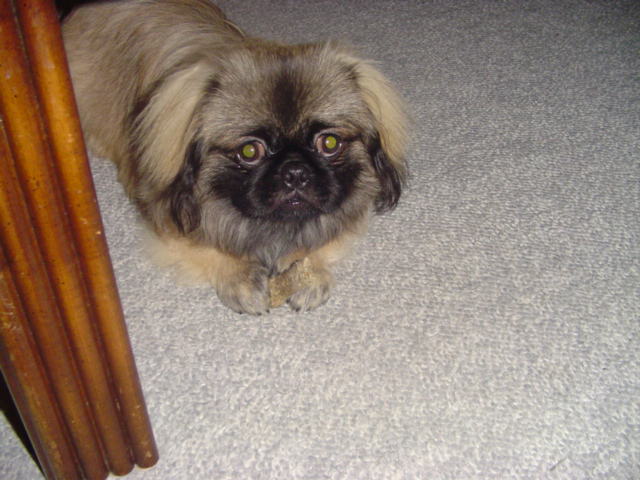


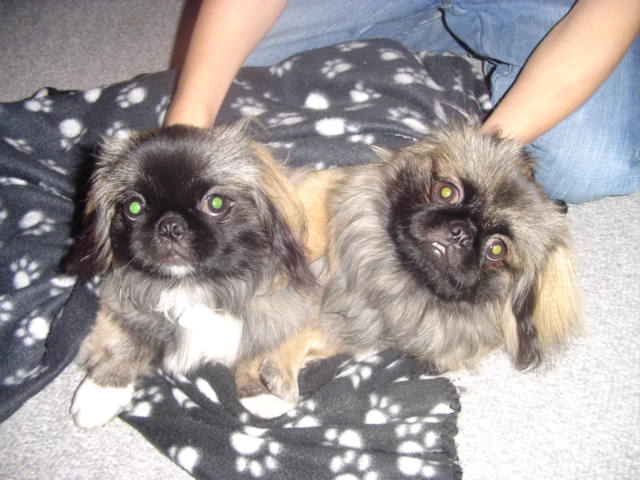


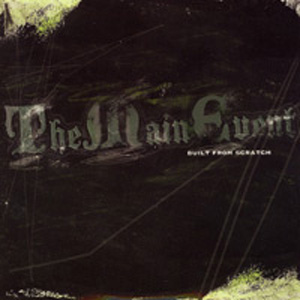 Band of the Month time, yo. But I think an image of an album cover is enough to trigger the synapse that tells you that you don’t care to read this blog post. Fuck you.
Band of the Month time, yo. But I think an image of an album cover is enough to trigger the synapse that tells you that you don’t care to read this blog post. Fuck you.











